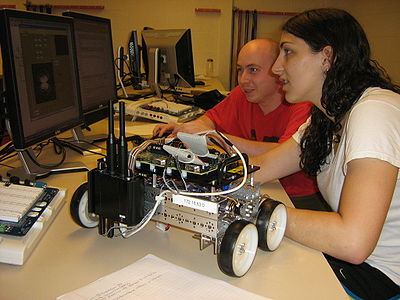Difference between revisions of "ESE297 - Intro to Undergraduate Research"
From ESE497 Wiki
Jump to navigationJump to search| Line 8: | Line 8: | ||
* '''T/A''': | * '''T/A''': | ||
* '''[[media:Syllabus-FL14.pdf |Syllabus]]''' | * '''[[media:Syllabus-FL14.pdf |Syllabus]]''' | ||
| − | * '''Expectations''': The work load is estimated to be 10 hours/week if you take it during the Fall or Spring semesters | + | * '''Expectations''': The work load is estimated to be 10 hours/week if you take it during the Fall or Spring semesters (20 hours/week for a summer semester). That is, students who earn an A will spend many unsupervised hours outside of the class meeting times. Grading is based on your Homework and your Projects. Late work will be accepted with a penalty of 3 points per day. Please see the syllabus for due dates. |
= Announcements = | = Announcements = | ||
Revision as of 18:05, 10 August 2015
ESE297 - Introduction to Undergraduate Research was created for students who wish to do Undergraduate Research projects in Robotic Sensing under Professor Nehorai, the ESE Department Chair. This course is offered as ESE297 for 2 credits and is typically offered in the spring and summer. Students will learn how to implement sensor array signal processing algorithms on the LabVIEW for Robotics Starter Kit robots shown above using both Matlab and LabVIEW and develop Brain Computer Interface (BCI) algorithms using EEG signals. Students can then apply this knowledge to individual research projects in Robotic Sensing in subsequent semesters. ESE297 does not qualify as an EE elective.
Logistics
- Meeting Time: Mon-Wed, 8:30-10 in Bryan 316 from 8/25 - 12/5
- Holidays: 1/20, Spring Break
- Instructor: Ed Richter
- T/A:
- Syllabus
- Expectations: The work load is estimated to be 10 hours/week if you take it during the Fall or Spring semesters (20 hours/week for a summer semester). That is, students who earn an A will spend many unsupervised hours outside of the class meeting times. Grading is based on your Homework and your Projects. Late work will be accepted with a penalty of 3 points per day. Please see the syllabus for due dates.
Announcements
Lecture Notes
- Accostic Source Location
- Data Acquisition Basics
- Signal Processing Basics
- Brain Computer Interface (BCI), BCI2000.zip
Projects
- Project1: Implement algorithm using microphone array
- Project2: Triangulation with sbRIO robots
- BCI Projects
2013 Upgrade work-around
- Copy RobotMicSourceLocator.vi to RoboticSensing\MicSourceLocator
- Copy MoveWheels (Host).vi to RoboticSensing\Examples\MoveWheels (Host).vi (***NOTE*** Change '_' to ' ')
- Copy MoveRobot.vi to RoboticSensing\MicSourceLocator
